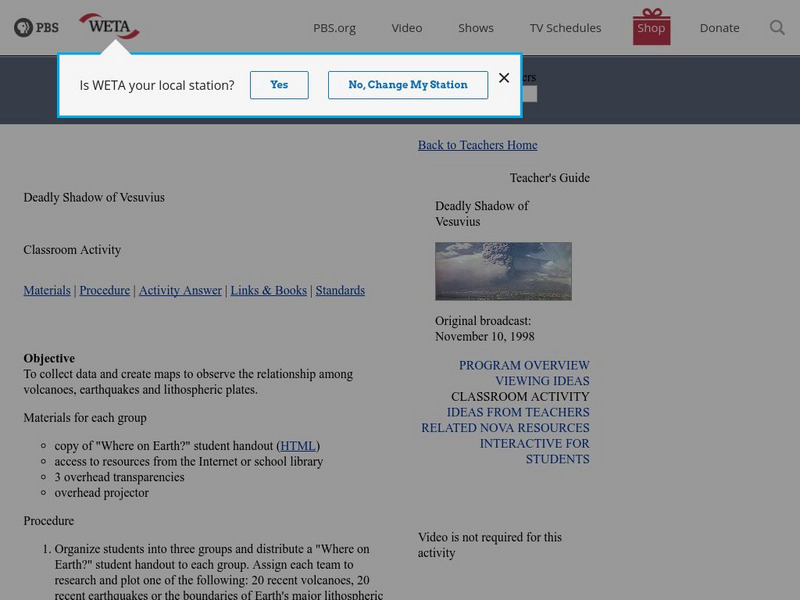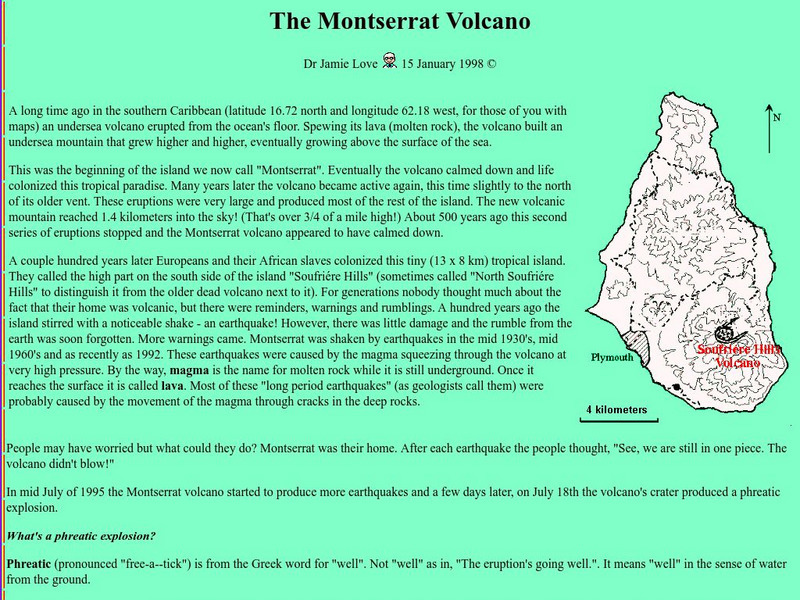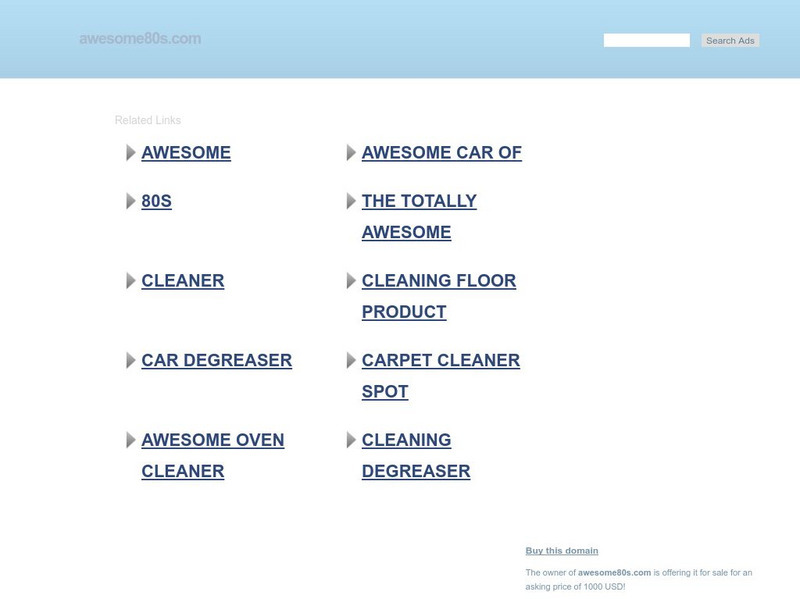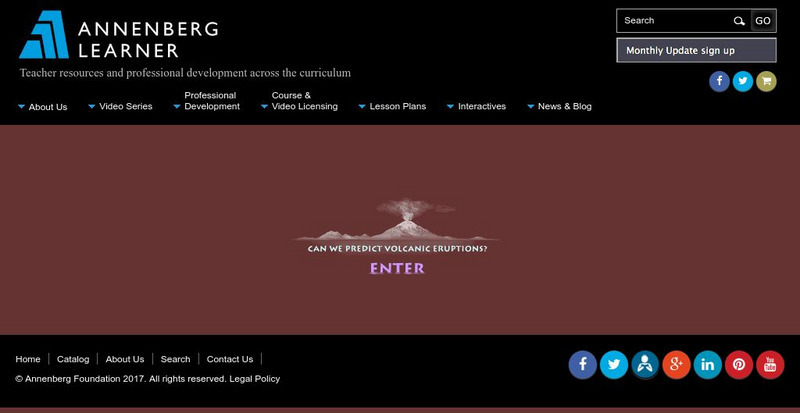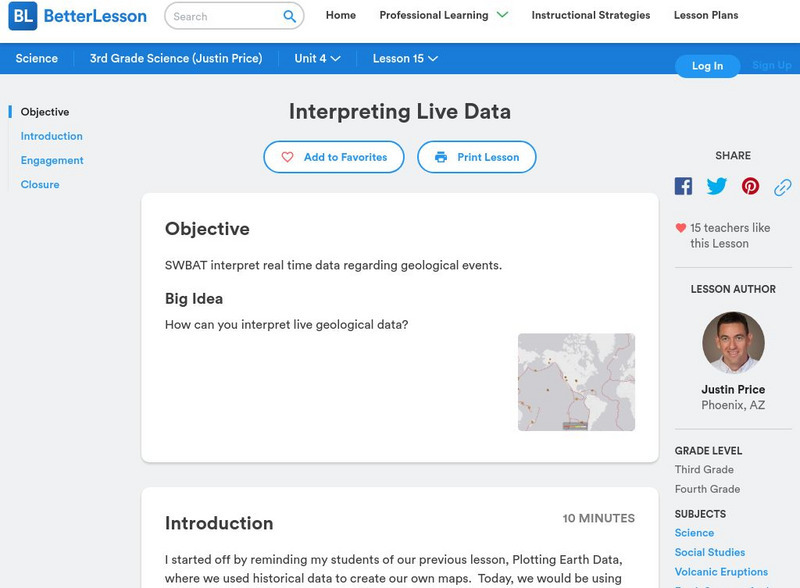Center for Educational Technologies
Center for Educational Technologies: Exploring the Environment: Volcanoes
Learn about volcanoes and apply what you know to making decisions about how to handle real world situations. You will find lots of supporting materials for these activities.
PBS
Pbs Learning Media: Anatomy of a Volcano
In this interactive activity from NOVA Online, explore the main features of the Nyiragongo volcano, located in the Democratic Republic of Congo, and learn what risks it poses to the 500,000 people who live in its shadow.
University Corporation for Atmospheric Research
Ucar: Little Ice Age: Dark Skies: Volcanic Contribution to Climate Change
In this activity, young scholars learn how volcanic eruptions affect global climate.
Oregon State University
Volcano World: Krakatau, Sundra Strait
Maps and great graphics of Krakatau. Learn about the size and formation of Krakatau. Find out the last time Krakatau erupted. Also, links to recent photos.
University of Hawai'i
The Hawai`i Space Grant Consortium: Volcanology Activity
There are 5 experiments with teacher and student pages. EXCELLENT hands on experiments. Young scholars can learn how lava flows, lava layering and viscosity.
PBS
Nova: Mystery of the Megavolcano
Learn about the 74,000 year old eruption of the Toba volcano which produced 670 cubic miles of magma. Compare its' dimensions to other famous eruptions to get an understanding of its enormous dimensions.
PBS
Pbs: Nova: Dimming the Sun
An online presentation of NOVA's program Dimming the Sun. You can read a transcript of the show, read an essay on the effect of contrails on global warming, and view slideshows tracing a timeline of climate change and new technologies...
PBS
Pbs Teachers: Deadly Shadow of Vesuvius
Observe the relationship among volcanoes, earthquakes and lithospheric plates by collecting data and creating maps. This activity was created to be used with the NOVA program, "Deadly Shadow of Vesuvius" but the video is not necessary...
PBS
Nova: World's Deadliest Volcanoes According to the Volcanic Explosivity Index
Learn how scientists measure the size of a volcanic eruption. After viewing a recreation of the volcanic eruption of Mount St. Helens, you will be challenged to rate it using the volcanic explosivity index (VEI).
PBS
Nova: Planning for Disaster
In September 1994, Rabaul volcano on the Papua New Guinean island of New Britain erupted. Very few people were killed due to a well designed evacuation plan. Get the details on the planning that saved thousands of lives.
PBS
Pbs Learning Media: Band of Volcanoes in the Pacific
Students can form conclusions about the location and formation of volcanoes by viewing pictures and maps. These pictures show eruptions, plumes of smoke, and an underwater volcano. The map shows the location of volcanoes in the Ring of...
Other
Science Explained: Montserrat Volcano
Read an illustrated description of how an undersea volcanic eruption formed the Caribbean island of Montserrat. Includes a lengthy description of volcanic processes and defines many volcanic terms, such as lahar, tephra, and pyroclastic...
US Geological Survey
Us Geological Survey: Monitoring Active Volcanoes
This site from the US Geological Survey contains four pages full of information. The introduction discusses how volcanoes are monitored, the technique page discusses the equipment and the case studies show data. There is a conclusion at...
US Geological Survey
Usgs: Types of Volcanic Eruptions
Types of volcanic eruptions are named after actual volcanoes. View the eruptions of these volcanoes.
US Geological Survey
Us Geological Survey: Map of Ring of Fire
A clear map of the Ring of Fire, with each volcano named. There are a few sentences of caption under the map.
US Geological Survey
Us Geological Survey/ Historic Eruptions
Tambora of Indonesia had one of the deadliest eruptions since 1500. You will learn about the volcano and you can link to other related items.
US Geological Survey
Usgs: Volcanic Hazards, Features, and Phenomena
Site from the U.S. Geological Survey provides a brief list of volcano terminology including descriptions as well as links to major menus.
University of Wisconsin
The Why Files: Volcanic Activity
A resource to help understand how volcanoes work and how the can affect their surroundings.
Other
Lanzarote Guide: Volcanic Eruptions
The Lanzarote volcanic mountains erupted in 1700, destroying many villages. Read about the eruptions at this site.
Other
Awesome80s.com: Mt. St. Helen's Eruption
Read about the eruption of Mt. St. Helen's. Includes first-hand descriptions by geologists. Also includes a table which lists other notable volcanic eruptions that have happened in the 20th century.
Annenberg Foundation
Annenberg Learner: Volcanoes Interactives
A full-featured investigation of volcanoes that answers questions about our ability to predict eruptions. Site begins with a review of the fundamentals (defines lava, magma, and related terms and describes how volcanoes form) and then...
Better Lesson
Better Lesson: Interpreting Live Data
Students will be using live data about volcanoes and earthquakes to look for patterns and understand why natural disasters may or may not be able to be predicted. Resources include helpful websites, a video of the lesson in action,...
Natural History Museum
Natural History Museum: Volcanoes
Learn about the role volcanoes have played in shaping the Earth by engaging in interactive activities such as building a volcano or learning about the lava, water vapor, and gases that erupt from volcanoes.
Center for Educational Technologies
Nasa Classroom of the Future: Volcanoes
Use this site to discover some interesting facts about volcanoes and how they affect the earth. See some great animation and photos of volcanoes as well.








